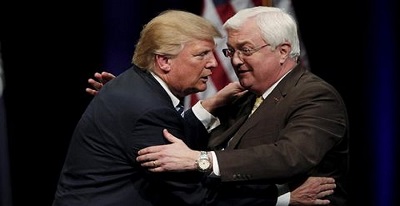Food Program Deserves Prize, Beasley’s Playbook Should Be Followed: Van Hipp
Featured photograph: Head of the World Food Programme David Beasley (WFP) David Beasley attended a press conference about an updated aid appeal for South Sudan on May 15, 2017 at the United Nations Office in Geneva. (Fabrice Coffrini/AFP/Via Getty Images)

President Ronald Reagan said that, “Personnel is Policy.”
And nowhere in recent times have we seen the difference that good people in key jobs can make than last Friday, when the World Food Programme (WFP) was awarded the Nobel Peace Prize.
Yes, the Nobel Committee got it right this time.
The WFP was created at the request of President Dwight Eisenhower to provide food aid through the United Nations’ system.
Today, with a staff of some 17,000, it’s the world’s largest humanitarian organization focused on hunger and food security, and helps feed close to 100 million people in 88 countries annually.
This year, with the global coronavirus pandemic, food shortages occurred; hunger worsened.
The WFP was challenged like never before, but was up to the task.
You see, something has happened at the WFP in recent years that enabled it to meet the challenge of 2020 and continue its mission of providing food assistance to almost 100 million people during a global pandemic.
That “something,” or rather, “someone” is former South Carolina Governor, David Beasley, who became the WFP’s executive director in 2017.
WFP’s executive director in 2017.
Beasley is known for doing what he believes is right, regardless of the consequences.
In 2003 he was awarded the John F. Kennedy Profile in Courage Award.
He’s also not your typical U.N. bureaucrat, going so far as to tell a reporter that he’s “not a UN kind of guy.”
Rather, David Beasley is a businessman and administrator who grew up in the farming-rich Pee Dee region of South Carolina.
So, he knows agriculture and business.
At the outset of his WFP tenure, he focused on modernizing the WFP with new technology platforms and reaching out to and integrating the private sector.
Beasley has also surrounded himself with good people, like his chief of staff, former U.S. congressman and one-time U.S. Army Officer, Gresham Barrett.
Beasley’s almost nonstop, 24/7 schedule has enabled him to actually get to know WFP personnel in some 80-plus countries and boost morale.
Additionally, his hands on aproach style has helped the WFP to address logistical supply chain issues long plaguing the U.N. agency.
He’s constantly in the field, ensuring food is getting to those most in need.
He tested positive for COVID-19 in March. But, after recuperating at his South Carolina farm, he was back at it again, tackling hunger with the same breakneck pace WFP employees have grown accustomed to.
How Beasley and his team have positioned the World Food Programme’s work as a bulwark against terrorism and extremism is more than impressive.
 In fact, he once told The Guardian, that “Europe needed to wake up” to the fact that ISIS militants fleeing Syria were working with other radical Islamist groups in Africa to destabilize the continent and push more migration into Europe.
In fact, he once told The Guardian, that “Europe needed to wake up” to the fact that ISIS militants fleeing Syria were working with other radical Islamist groups in Africa to destabilize the continent and push more migration into Europe.
Since he took control of the WFP, Beasley has said that the WFP’s work could and should counter the efforts of terrorist groups who have used a lack of food as both a tool for recruitment and for fighting local and national government structures.
In addition to actively working with the private sector to seek better solutions and technology, Beasley and the WFP have inspired universities and students in the U.S. and globally to address hunger, food security, and nutrition issues.
During a visit to Clemson University, he praised both Clemson and Auburn universities for signing on to WFP’s “Presidents United to Solve Hunger (PUSH) Commitment.”
Under PUSH, universities pledge to make food and nutrition security a priority in teaching, research, outreach, and student engagement.
He also met with Florida Atlantic University (FAU), which works closely with the U.S. Agriculture Research Service on aquaculture approaches to address the seafood shortage.
And Baylor University’s “Collaborative on Hunger and Poverty,” with the U.S. Department of Agriculture (USDA), to deliver food boxes to students in rural schools closed due to COVID-19, looks like it came out of the WFP playbook.
Since the U.S. provides over 40% of the WFP’s annual resources, America has historically had a big say in who leads the WFP. Here, much credit should be given to another former South Carolina Governor, Nikki Haley. It was Haley, as U.S. Ambassador to the United Nations, who pushed hard for Beasley and shepherded his appointment.
At a time when America needs bipartisanship, it’s refreshing to see U.S. Reps. Robert Aderholt, R-Ala., and Jim McGovern, D-Mass., have come together to co-sponsor a resolution in the U.S. House this week supporting the leadership of Beasley and the contributions of the WFP staff glboally. The House Resolution further affirms the mission of the WFP and secures the United States’ commitment to the international community’s goal to end hunger, achieve food security, and improve nutrition through the WFP.
Yes, the Nobel Committee got it right this year by awarding the Nobel Peace Prize to the World Food Programme. The WFP, under David Beasley’s leadership, reforms, and business approaches has made a difference in the lives of millions globally.



